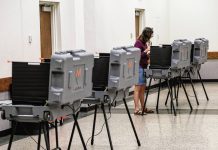JENNINGS COUNTY — A Jennings County public official says a recent declaration from the county sheriff that the county is a Second Amendment Sanctuary is a “claim that has no teeth.”
Jennings County Commissioner President Matt Sporleder said he has learned after talking to some state lawmakers that Second Amendment Sanctuary resolutions such as the one signed by Sheriff Kenny Freeman are “little more than a political statement.”
The resolution also was signed by state Rep. Jim Lucas, R-Seymour, and North Vernon Mayor Mike Ochs during a Jan. 17 ceremony in the sheriff’s department lobby.
“What this means is that we will enforce the gun laws that are currently in effect (in Indiana and the United States), but we will not enforce new laws,” Freeman said at the signing.
After the resolution was signed, many south central Indiana residents debated the legitimacy of the declaration on social media, some saying it sent a strong message that gun rights should be supported throughout the state, while others said it carried no force of law since it had not been approved by a county governing body.
“It’s mostly a symbolic effort,” said Mark Matthews of Norman as he asked the Jackson County Commissioners to support the concept of a Second Amendment Sanctuary in that county last week.
Paul Helmke, who teaches at the O’Neill School of Public and Environmental Affairs at Indiana University, Bloomington, said efforts such as Second Amendment sanctuaries represent misunderstandings about the Constitution, as well as the Second Amendment.
The Constitution can only be interpreted by the U.S. Supreme Court, said Helmke, a former three-term mayor of Fort Wayne who was also the Republican nominee for U.S. Senate in 1998.
In 2008, the U.S. Supreme Court ruled the Second Amendment protects an individual’s right to keep and bear guns, unconnected with service with a militia, for traditional lawful purposes. But looking deeper into that case (District of Columbia v. Heller), they’ll discover the Supreme Court also ruled that common sense restrictions intended to reduce gun violence are constitutional, Helmke said.
“That includes who can buy guns, who can sell them, how guns are sold, how weapons are carried, how guns are stored – and even what type of guns should be available to the general public,” Helmke said.
The former state senator said it’s worth noting the majority decision in the 2008 case was written by the late Justice Antonin Scalia, a member of the court’s conservative wing. Four other conservative judges (Roberts, Kennedy, Thomas and Alito) all concurred.
Columbus and Bartholomew County were also approached recently with a request to declare the county a Second Amendment Sanctuary, which officials declined to do in a written statement that was shared with the media.
There’s no doubt that if elected officials refuse to enforce state and federal laws, they are violating the oath they swore to uphold the Constitution, Bartholomew County Commissioners chairman Carl Lienhoop said.
Lienhoop made the comment Jan. 23 after Columbus and Bartholomew County jointly announced they would not consider Second Amendment sanctuary proposals.
The joint statement was in response to a group calling itself the Bartholomew County Indiana 2A United Sanctuary. The group had sent a draft of a proposed Second Amendment Sanctuary ordinance to the city and the county, as well as Bartholomew County Sheriff Matt Myers.
“The proposal appears to be an attempt to usurp or supersede the authority of the courts,” the statement from Columbus and Bartholomew County officials said.
The Second Amendment, as well as other court decisions that recognize an individual’s right to keep and bear arms, were cited by city and county officials as reasons why sanctuary status was not needed locally.
In addition, the statement said the proposed ordinance doesn’t reflect the role or responsibility of city and county government.
Commissioner Carl Lienhoop stressed he and other local elected officials had all taken oaths to support and defend the Constitution — which includes upholding and enforcing laws.
And there’s another reality to consider, Carl Llienhoop said.
“If the federal government really wants to play hardball, they can say ‘OK … you guys want to become a sanctuary territory? We’ll just cut your federal funding off,” Carl Lienhoop said. “All of it.”
That applies to city, county and state governments who set up either illegal immigrant or firearms sanctuaries, he said.
Former Columbus resident Chris Imel, who proposed the idea for Bartholomew County, ended his public response to Bartholomew County’s refusal by stating, “It’s very disheartening that those officials who released the statement do not believe in our Second Amendment rights.”
That statement was countered by Bartholomew County commissioner Larry Kleinhenz, who described Imel’s words as “very damaging to us and not truthful in any way.”
The statement leaves a false impression that elected city and county leaders, as well as the Bartholomew County sheriff, don’t support the Second Amendment, Kleinhenz wrote in an email to the Republic.
Sporleder says keeping his oath of office in Jennings County is the main concern he has about the Second Amendment Sanctuary resolution.
When the sanctuary proposal was raised at a recent Jennings County commissioners meeting in Vernon, Sporleder said he emphasized that federal law supersedes state law, and that state law supersedes local laws.
“So how can this resolution signed by the sheriff have any merit to it?” the commissioner said of the Jennings County resolution.
Jordan Morey, a Seymour Tribune reporter, contributed to this report.
[sc:pullout-title pullout-title=”What are Second Amendment sanctuaries?” ][sc:pullout-text-begin]
A Second Amendment sanctuary, also known as a gun sanctuary, refers to states, counties, or localities in the United States that have adopted laws or resolutions to prohibit or impede the enforcement of certain gun control measures. Advocates claim measures such as universal gun background checks, high capacity magazine bans, assault weapon bans, and red flag laws violate their constitutional rights.
Source: Reason Magazine, Nov. 19, 2019
[sc:pullout-text-end]




